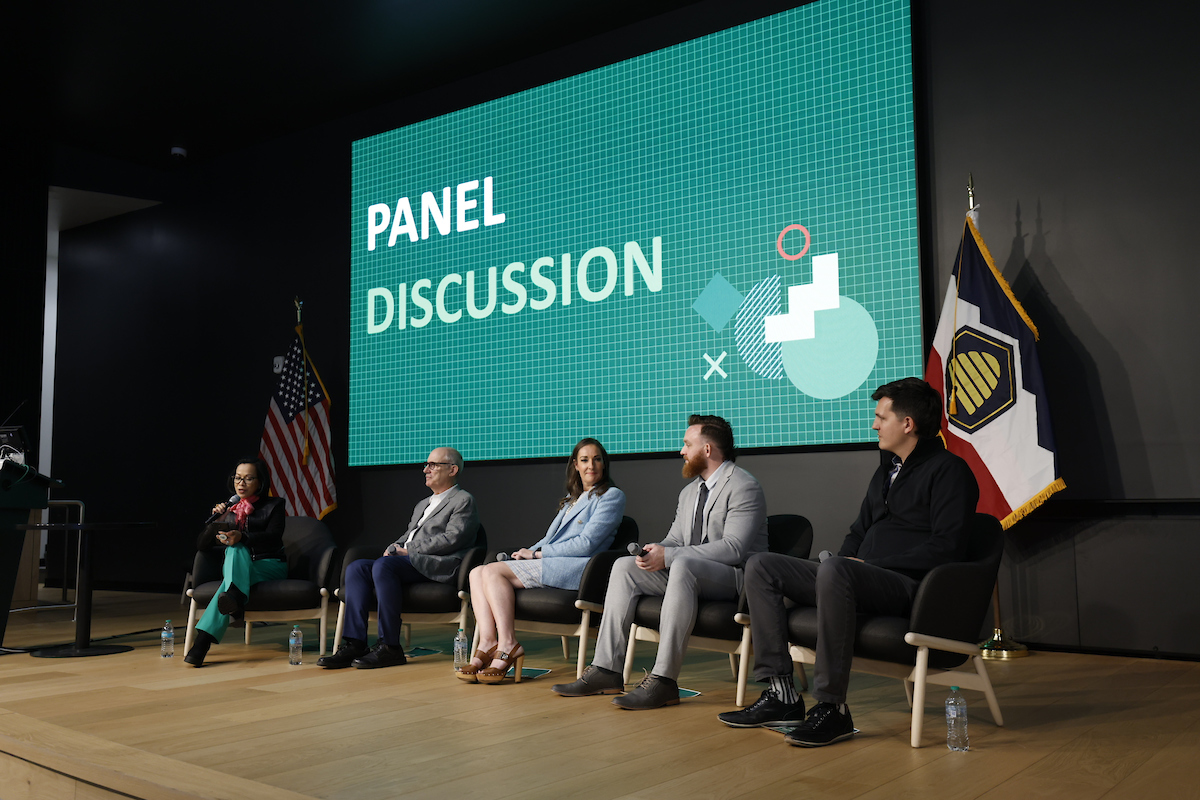Utah Valley University (UVU) students from a variety of academic disciplines presented collaborative research on whether people can detect deepfake content and deepfake content’s ability to impact elections during the Election Integrity Deepfakes Forum held on Utah Valley University’s Main Campus on Oct. 28 in the Vallejo Auditorium.

Utah Valley University (UVU) students from a variety of academic disciplines presented collaborative research on whether people can detect deepfake content and deepfake content’s ability to impact elections during the Election Integrity Deepfakes Forum held on Utah Valley University’s Main Campus on Oct. 28 in the Vallejo Auditorium.
The study — conducted by the university’s Herbert Institute for Public Policy, the UVU Sales Marketing Applied Research Test Laboratory (SMARTLab), and the UVU Center for National Security Studies —tested 244 subjects across the United States with real and deepfake videos and audio to determine their ability to distinguish between the two.
“Artificial intelligence is a tremendous tool, but this research tells a cautionary tale for our democracy by illustrating how easily it can be used to push fake messages to voters,” said Brandon Amacher, director of the UVU Emerging Tech Policy Lab and instructor for the UVU Center for National Security Studies. “It is incumbent that we address this issue from a technology perspective, a public policy perspective, and a voter education perspective.”
Former Utah Governor Gary R. Herbert discussed the challenges posed by AI-generated deepfakes to the election process, emphasizing the difficulty in distinguishing truth from fiction.
“We're not going to stand still for fake information being delivered to us to confuse us and maybe cause us to vote when we don't want to vote,” Herbert said. “Technology is causing the problem, but technology is going to help us find the solution.”
Herbert expressed his confidence in the UVU Institute for Public Policy’s partnership with SureMark Digital, a pilot project that allows political candidates to authenticate their digital identity for free, thus curtailing any deepfake media content.
Utah Lieutenant Governor Deidre Henderson shared Utah’s history of voting rights, including women’s suffrage, and emphasized the importance of maintaining trust in the electoral process despite rampant misinformation regarding widespread election fraud.
“We will have an election next week that about half the country won't like the outcome of,” Henderson said. “But we have to understand as Americans, as Utahns, we've got to come together. We have to be able to live with each other no matter what those results are. We are not in the business of destroying our political enemies if we win or if we lose. As Americans, the secret to our free government [and] our success is our ability to come together, to unite, to collectively solve our problems despite our disagreements, despite differing and strongly held beliefs or political philosophies. We must do this. We must commit ourselves to accept the results of the election, no matter what they are.”
Three UVU students — William Friedman, Hope Fager, and Mauricio Cornejo — then presented their findings of the election integrity deepfakes study, which showed that deepfake and genuine media had effectively the same impact on views as real content, that viewers have difficulty identifying deepfakes in retrospect, and that viewers have higher levels of engagement and confusion when exposed to deepfake content.
Following the students’ presentations of research, UVU President Astrid S. Tuminez hosted a discussion with a panel of AI and civic leaders, including Lt. Gov. Deidre Henderson, Utah County Commissioner Amelia Powers Gardner, Defending Digital Campaigns President Michael Kaiser, UVU Professor Brandon Amacher, and Chairman of SureMark Digital Scott Stornetta.
Kaiser emphasized the urgency of addressing election interference, particularly in the digital environment, and highlighted the role of technology in both facilitating and combating disinformation from foreign countries.
Commissioner Gardner underscored the importance of electors going to trusted sources, such as county clerks’ offices, for accurate information and the need to distinguish between human error and malfeasance.
The panel concluded with a call to action from panelist Scott Stornetta:
“Now is the time where it's not just up to the people on this stage and up to the other government institutions and nonprofits and corporations that are trying to solve this at a systemic level,” he said. “Now is the time for everybody, all of us, to be looking at everything that we're seeing, to be protecting ourselves, and asking, ‘Is this real? Can I trust it?’”